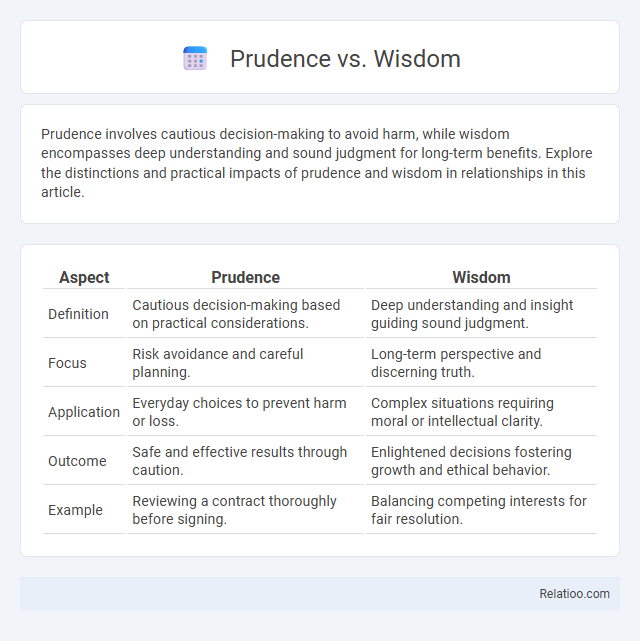Prudence involves cautious decision-making to avoid harm, while wisdom encompasses deep understanding and sound judgment for long-term benefits. Explore the distinctions and practical impacts of prudence and wisdom in relationships in this article.
Table of Comparison
| Aspect | Prudence | Wisdom |
|---|---|---|
| Definition | Cautious decision-making based on practical considerations. | Deep understanding and insight guiding sound judgment. |
| Focus | Risk avoidance and careful planning. | Long-term perspective and discerning truth. |
| Application | Everyday choices to prevent harm or loss. | Complex situations requiring moral or intellectual clarity. |
| Outcome | Safe and effective results through caution. | Enlightened decisions fostering growth and ethical behavior. |
| Example | Reviewing a contract thoroughly before signing. | Balancing competing interests for fair resolution. |
Understanding Prudence: Definition and Key Traits
Prudence is the ability to govern and discipline oneself through the use of reason, emphasizing careful judgment, foresight, and caution in decision-making. It involves assessing potential risks and benefits to avoid harm and promote long-term well-being, distinguishing it from wisdom, which encompasses broader knowledge and experience, and sagacity, which highlights keen perception and insight. Key traits of prudence include self-control, practical reasoning, and the capacity to delay gratification for favorable outcomes.
Defining Wisdom: More Than Knowledge
Wisdom encompasses deep understanding, sound judgment, and the ability to apply knowledge effectively in complex situations, unlike mere accumulation of facts or prudence, which emphasizes cautiousness and careful decision-making. It integrates experience, insight, and ethical considerations to navigate challenges and foresee consequences, setting it apart from prudence's more risk-averse nature. Defining wisdom requires recognizing its holistic approach to knowledge that prioritizes meaningful application over theoretical understanding.
Historical Perspectives: Prudence vs. Wisdom
Historical perspectives distinguish prudence as practical judgment guiding everyday decisions, while wisdom encompasses deeper understanding and moral insight accumulated over time. Ancient philosophers like Aristotle emphasized prudence (phronesis) as a key virtue for ethical living, whereas wisdom was seen as a broader intellectual and spiritual mastery. Your grasp of these concepts evolves by recognizing prudence's tactical role and wisdom's strategic, long-term vision.
Prudence in Everyday Decision-Making
Prudence plays a crucial role in everyday decision-making by helping you evaluate potential risks and benefits before acting. Unlike wisdom, which encompasses deep understanding and experience, prudence focuses on practical judgment and foresight in specific situations. Consistently applying prudence ensures that your choices are balanced, careful, and aligned with long-term goals.
The Role of Wisdom in Life’s Challenges
Wisdom plays a crucial role in navigating life's challenges by enabling you to apply knowledge and experience with discernment and insight. Unlike prudence, which emphasizes carefulness and risk avoidance, wisdom integrates ethical values and long-term perspective to make balanced decisions. This comprehensive approach helps you resolve conflicts, adapt to change, and achieve meaningful growth.
Comparing Prudence and Wisdom in Ethical Dilemmas
Prudence involves careful judgment and foresight to avoid risks in ethical dilemmas, emphasizing practical decision-making based on circumstances. Wisdom encompasses a deeper understanding of moral principles, integrating experience and insight to discern what is truly right beyond immediate outcomes. Comparing both, prudence guides actions to prevent harm while wisdom shapes the ethical framework that defines the right course, creating a balance between caution and moral clarity.
Can Prudence Exist Without Wisdom?
Prudence involves careful judgment and cautious decision-making, while wisdom encompasses deep understanding and the ability to apply knowledge effectively in varied situations. Prudence can exist without wisdom, as you might act cautiously based on limited information or rigid rules without truly understanding the broader implications or long-term consequences. However, integrating wisdom enhances prudence by guiding your decisions with insight and experience, ensuring more balanced and informed choices.
The Interplay Between Caution and Insight
Prudence involves cautious decision-making rooted in avoiding risks, while wisdom encompasses deep insight gained from experience and knowledge. The interplay between caution and insight enhances Your ability to make balanced decisions that consider both potential dangers and long-term benefits. Combining prudence with wisdom ensures thoughtful actions guided by foresight and practical understanding.
Cultivating Prudence and Wisdom: Practical Steps
To cultivate prudence and wisdom effectively, focus on developing critical thinking skills and learning from past experiences. You can enhance decision-making by reflecting on outcomes and seeking diverse perspectives to gain deeper insights. Establishing mindful habits, like journaling and setting clear goals, helps integrate prudence and wisdom into everyday choices.
Choosing Prudence or Wisdom: Which Leads to Fulfillment?
Choosing wisdom over prudence often leads to deeper fulfillment because wisdom encompasses not only cautious decision-making but also profound insight and understanding of life's complexities. Prudence, characterized by careful judgment and foresight, guards against risks but may limit growth by avoiding necessary challenges. Therefore, wisdom's blend of knowledge, experience, and discernment fosters meaningful experiences and personal fulfillment beyond the safety net that prudence alone provides.

Infographic: Prudence vs Wisdom
 relatioo.com
relatioo.com